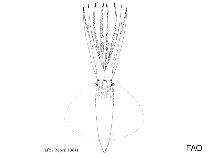Octopoteuthis nielseni (Robson, 1948)
Google image | No image available for this species;
drawing shows typical species in Octopoteuthidae.
Classification / Names ชื่อสามัญ | ชื่อพ้อง | CoL | ITIS | WoRMS
Cephalopoda | Oegopsida | Octopoteuthidae
Environment: milieu / climate zone / ระดับความลึก / distribution range นิเวศวิทยา
สัตว์น้ำหน้าดิน. Tropical
Distribution ประเทศต่างๆ | พื้นที่จำแนกตาม FAO | ระบบนิเวศหลายระบบ | การปรากฏขึ้น,การเกิดขึ้น,พบ | การแนะนำ
Eastern Central Pacific: Cocos and Hawaii.
Length at first maturity / ขนาด / Weight / Age
วัยเจริญพันธุ์: Lm ? range ? - ? cm
Life cycle and mating behavior วัยเจริญพันธุ์ | การสืบพันธุ์ | การวางไข่ | Eggs | ความดกของไข่ | Larvae
Main reference
อ้างอิง | ผู้ประสานงาน | ผู้ร่วมมือ
Bisby, F.A., M.A. Ruggiero, K.L. Wilson, M. Cachuela-Palacio, S.W. Kimani, Y.R. Roskov, A. Soulier-Perkins and J. van Hertum 2005 Species 2000 & ITIS Catalogue of Life: 2005 Annual Checklist. CD-ROM; Species 2000: Reading, U.K. (อ้างอิง 19)
IUCN Red List Status
(อ้างอิง 130435: Version 2025-1)
CITES status (อ้างอิง 108899)
CMS (อ้างอิง 116361)
Threat to humans
Human uses
| FishSource |
เครื่องมือ
ข้อมูลเพิ่มเติม
Max. ages / sizes
Length-weight rel.
Length-length rel.
Length-frequencies
Mass conversion
อุดมสมบรูณ์
แหล่งที่มาจากอินเตอร์เน็ต
BHL | BOLD Systems | CISTI | DiscoverLife | FAO(Publication : search) | Fishipedia | GenBank (genome, nucleotide) | GloBI | Gomexsi | Google Books | Google Scholar | Google | PubMed | แผนภูมิชีวิตแบบต้นไม้ | Wikipedia (Go, ค้นหา) | บันทึกทางด้านสัตววิทยา



